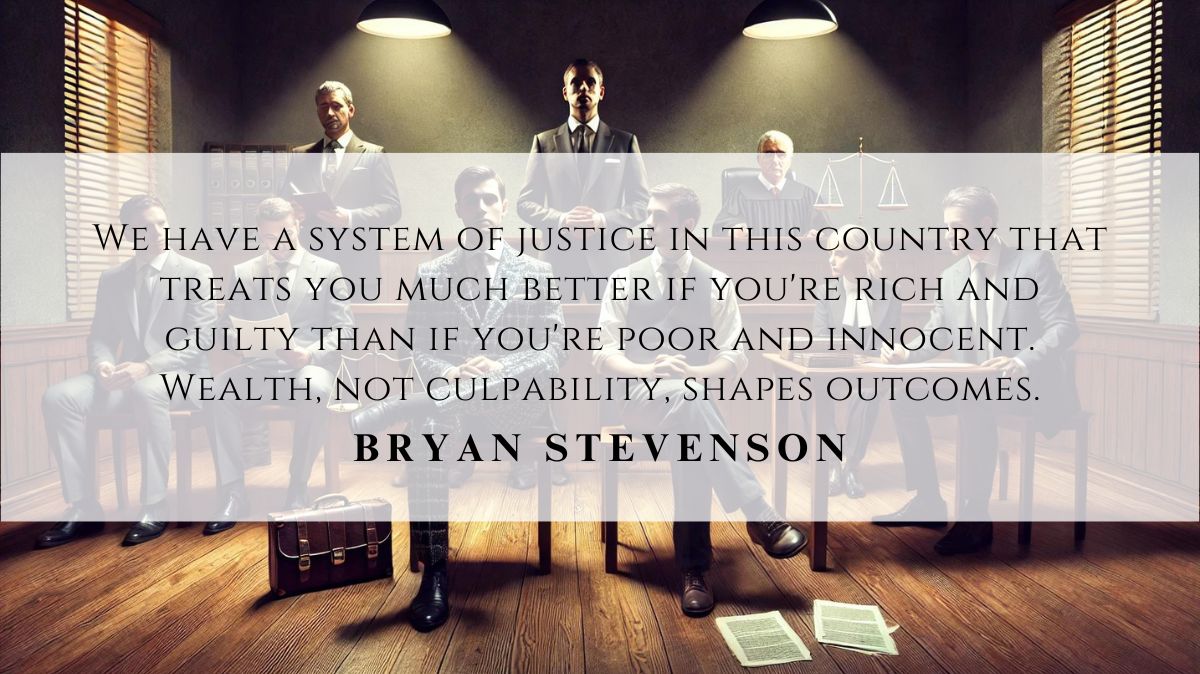Bryan Stevenson, a lawyer, social justice activist, and author, is best known for his relentless advocacy for the poor, the wrongly convicted, and those trapped in the broken American justice system. His words have inspired countless individuals to rethink their perspectives on justice, empathy, and the role of humanity in the fight for equality. Here are 50 Bryan Stevenson quotes that not only embody his philosophy but also provide timeless insight into the human condition. Buckle up, it’s going to be both deep and thought-provoking (with a sprinkle of humor because, hey, even serious topics need a breather).
Content Index
Bryan Stevenson Quotes About Justice and Hope
“We have a system of justice in this country that treats you much better if you’re rich and guilty than if you’re poor and innocent. Wealth, not culpability, shapes outcomes.”
This quote cuts straight to the core of the problem: the disparity in the justice system based on wealth. Bryan Stevenson doesn’t sugarcoat it. If you’re rolling in money, your guilt can be overshadowed, but if you’re struggling financially, you’re in for a rough ride, no matter your innocence. It’s an eye-opener that makes us question the fairness we often assume exists. Bryan Stevenson, through his Equal Justice Initiative, has spent his career fighting this unjust reality.“The opposite of poverty is not wealth; the opposite of poverty is justice.”
This powerful line emphasizes that while many think the solution to poverty is simply more money, true equity comes from justice. Stevenson redirects our focus from material wealth to fair treatment under the law, implying that poverty stems from systemic injustice rather than just a lack of funds.“Each of us is more than the worst thing we’ve ever done.”
This is one of Stevenson’s most famous quotes, speaking to the heart of human dignity. He’s saying, “You messed up? That doesn’t define you.” It’s a call to see beyond mistakes, offering a much-needed breath of empathy in a world that tends to write people off too quickly.“The death penalty is not about whether people deserve to die for the crimes they commit. The real question is: Do we deserve to kill?”
Stevenson poses a moral dilemma here. Instead of focusing on whether someone is “bad enough” to warrant execution, he challenges society to reflect on its own moral standing when endorsing the death penalty.“Hopelessness is the enemy of justice.”
Simple, yet profound. This quote illustrates that losing hope is the real threat to justice. Without hope, there’s no motivation to fight for change. Stevenson is basically telling us that even when things seem impossible, hope is what keeps justice alive.
Bryan Stevenson Quotes on Compassion and Empathy
“You can’t understand most of the important things from a distance, you have to get close.”
Stevenson highlights the importance of personal connection in understanding issues. It’s easy to cast judgment from afar, but real understanding comes when we get close to the people and the problems that need addressing.“The true measure of our character is how we treat the poor, the disfavored, the accused, the incarcerated, and the condemned.”
This speaks volumes about compassion and the human spirit. Stevenson reminds us that our integrity isn’t shown by how we treat our equals but by how we handle those less fortunate.“An absence of compassion can corrupt the decency of a community, a state, a nation.”
Without compassion, Stevenson argues, society erodes. He emphasizes the moral responsibility we have towards one another, reinforcing the idea that a society is only as strong as its kindness.“Proximity to the condemned and incarcerated made the question of each person’s humanity more urgent and meaningful, including my own.”
Stevenson’s proximity to those most marginalized forces a reckoning with his own humanity. It’s a reminder that we all need to get uncomfortable sometimes to truly appreciate the struggles of others.“We all need mercy, we all need justice, and perhaps we all need some measure of unmerited grace.”
This quote is a gentle nudge that none of us are perfect. Stevenson advocates for the universal need for grace, mercy, and justice, recognizing that sometimes we need to be given a break even when we don’t necessarily deserve it.
Bryan Stevenson on Systemic Racism and Injustice
“The racial history of this country and the way in which we’ve administered punishment in America is very much tied to our history of racial injustice.”
Stevenson isn’t afraid to confront uncomfortable truths, pointing out the undeniable link between racial inequality and the justice system. It’s a stark reminder that we can’t talk about one without acknowledging the other.“Slavery didn’t end in 1865, it evolved.”
He’s talking about how racial oppression didn’t disappear after the abolition of slavery—it just morphed into new forms, like mass incarceration and systemic inequality. A sobering reminder of how far we have yet to go.“I do what I do because I’m broken too.”
Vulnerability at its finest. Stevenson admits that he’s not acting from a place of moral superiority but because he too is affected by the brokenness of the world. It’s a humbling sentiment that makes his fight for justice even more relatable.“We have to resist the politics of fear and anger that has made us believe that these problems are not our problems.”
Fear and anger have been politicized to divide people, according to Stevenson. He challenges us to recognize that the problems of the marginalized are indeed our own if we hope to create a more just society.“Racial bias is a part of the DNA of this country.”
Stevenson doesn’t shy away from confronting the deep-seated racism in America. By likening racial bias to DNA, he underscores how intrinsic and far-reaching the problem really is.
Bryan Stevenson Quotes on the Power of Hope
“You’re not judged by your worst moment; you’re judged by how hard you work to make things right.”
Once again, Stevenson stresses that no one is beyond redemption. It’s not our mistakes that define us, but how we strive to fix them. A great reminder that perseverance matters more than perfection.“The power of justice is found in hope.”
There it is again—hope. Stevenson ties the concept of hope directly to justice, saying that the fight for fairness and equality can only persist if hope remains alive.“To be effective in fighting for justice, you have to be willing to stay hopeful even when it’s hard.”
A message for the fighters out there: don’t give up, even when the battle feels impossible. Stevenson reminds us that hope isn’t just a feeling—it’s a choice we have to make every day, especially in the face of adversity.“The moral arc of the universe is long, but it bends toward justice.”
Borrowing from Dr. Martin Luther King Jr., Stevenson reminds us that while the fight for justice may take time, it’s ultimately moving in the right direction. Patience and persistence are key.“We are all implicated when we allow other people to be mistreated.”
Stevenson wants us to know that injustice anywhere is a threat to justice everywhere. By standing by and doing nothing, we’re complicit in the mistreatment of others. So, basically, don’t just be a bystander.
Bryan Stevenson Quotes on Injustice and Inequality
“It’s never too late to be part of the solution, not the problem.”
Stevenson emphasizes that change can come at any time. Whether you’ve been part of the problem before, or you feel late to the cause, it’s never too late to start working towards justice.“In many parts of this country, the opposite of poverty is not wealth but injustice.”
Echoing a similar sentiment as an earlier quote, Stevenson highlights that injustice, not wealth, defines many areas of systemic poverty in America. He brings attention to the fact that wealth gaps are exacerbated by legal and societal inequities.“We will ultimately not be judged by our technology, our design, or our intellect. The thing that will be remembered is how we treated each other.”
While society often praises technological advancement and intellectual achievements, Stevenson argues that our legacy will be defined by compassion and humanity. How we treat one another will outlast any innovation.“The great evil of American slavery was not involuntary servitude, but the narrative of racial differences.”
Stevenson focuses on the long-lasting damage of the false narratives created to justify slavery. These myths of racial inferiority, he argues, are the true legacies of slavery that still shape society today.“We are all broken by something. But it’s the broken among us who can teach us how to heal.”
A powerful reflection on human vulnerability. Here, Stevenson suggests that those who have experienced hardship are often the ones who can guide others toward healing, as they have a deeper understanding of pain and resilience.
Bryan Stevenson Quotes on Reform and Redemption
“The people who are closest to the problem are the ones who have the most insight about the solution.”
Stevenson believes that those directly affected by injustice are the best equipped to create meaningful solutions. He reminds us that listening to marginalized voices is critical for true reform.“I’ve come to understand that justice is not just about fair outcomes; it’s about fair process.”
Here, Stevenson draws attention to the often-overlooked process of justice. It’s not enough for a result to be fair—how we get there is equally important, ensuring that everyone has a fair chance.“When we allow ourselves to be shaped by fear and anger, we deny ourselves the opportunity to be shaped by love.”
Stevenson encourages us to reject fear and anger as our primary motivators and instead let love and empathy guide our actions. In his eyes, love fosters true justice.“You measure the health of a society by how it treats its prisoners.”
This quote sums up one of Stevenson’s core beliefs: the way a society treats those who have the least power reveals its true moral fabric. The conditions of prisons, particularly how the incarcerated are treated, act as a moral barometer.“Injustice prevails where hopelessness persists.”
Without hope, injustice becomes entrenched. Stevenson connects the persistence of injustice to a lack of hope, urging that restoring hope can dismantle even the most deeply rooted inequities.
Bryan Stevenson Quotes About Race and Historical Injustice
“The legacy of racial inequality, like the legacy of slavery, will not be overcome by quiet indifference or passive engagement.”
Stevenson calls for active, vocal participation in the fight against racial inequality. He rejects the notion that societal issues will resolve themselves over time without deliberate effort and collective action.“We have a long history of having laws that were created to dehumanize and marginalize people of color.”
A stark reminder of the systemic roots of racial discrimination, this quote exposes how laws were historically designed to oppress people of color, not just socially but legally.“Truth and reconciliation are sequential.”
According to Stevenson, truth must come first—reconciliation can only follow once we’ve acknowledged and addressed the injustices of the past. Without truth, any attempt at reconciliation is superficial.“I am persuaded that we can’t get to where we’re supposed to go unless we talk about where we’ve been.”
Stevenson emphasizes the need to confront historical truths before moving forward. Progress can’t happen if we continue to ignore the painful parts of our past.“The death penalty in America is a direct descendant of lynching.”
In this quote, Stevenson connects America’s history of racial violence with modern capital punishment, arguing that the death penalty’s roots lie in the racially motivated executions of the past.
Bryan Stevenson Quotes on the Fight for Equality
“We are not free in America if we choose to ignore the millions of people who are incarcerated.”
Stevenson reminds us that freedom isn’t fully realized if millions of people remain imprisoned, often unjustly. He calls for attention to be paid to the incarcerated, urging us not to forget them in our pursuit of liberty.“It’s not enough to celebrate civil rights heroes; we must also fight the battles they were fighting.”
He argues that honoring the legacy of civil rights leaders is meaningless unless we continue their work. True homage means engaging in the ongoing fight for justice and equality.“There is no path to justice that is only comfortable and convenient.”
Stevenson acknowledges that the road to justice is difficult and often uncomfortable. However, it’s precisely this discomfort that leads to meaningful change.“Until we grapple with the difficulties of our past, we are going to be permanently tethered to that past.”
Here, Stevenson emphasizes that we can’t move forward as a society without confronting and resolving the injustices of the past. Ignoring history keeps us trapped in it.“Justice requires us to be uncomfortable.”
This quote reinforces the idea that creating a fair and just world often involves stepping out of our comfort zones. It’s not easy, but it’s necessary.
Bryan Stevenson Quotes on Moral Courage and Advocacy
“We are all implicated when we allow other people to be mistreated.”
Stevenson calls for moral accountability, urging us to recognize that silence in the face of injustice is a form of complicity. Standing by while others are mistreated affects us all.“It takes courage to care.”
Simple, yet profound. Stevenson underscores the bravery required to care deeply in a world that often rewards indifference. It’s not always easy, but it’s essential.“There’s no such thing as being a passive bystander in the face of injustice.”
He makes it clear that choosing to do nothing is, in fact, a choice. Silence and inaction in the face of injustice allow it to thrive.“If we don’t expect more from each other, hope better from one another, and recover from the hurt we experience, we are surely doomed.”
Stevenson argues that a lack of expectation and empathy toward each other will lead to societal failure. Recovery from hurt, both individual and collective, is essential for progress.“If we commit ourselves to fighting injustice, we will be pushed and we will be tired, but we will change the world.”
Stevenson doesn’t sugarcoat the difficulty of the fight for justice, but he holds fast to the belief that, ultimately, change is possible if we stay committed.
Bryan Stevenson Quotes on the Future of Justice
“The world’s problems aren’t solved by the strongest or the smartest, but by those who refuse to quit.”
Persistence, according to Stevenson, is the key to solving the world’s biggest challenges. It’s not about brute strength or intellect, but rather the refusal to give up in the face of adversity.“We must be willing to do uncomfortable things if we want to achieve justice.”
Stevenson reminds us that comfort often stands in the way of justice. Change doesn’t come from staying where we’re safe; it comes from pushing boundaries and challenging norms.“The most important thing you can do is stand up when everyone else is sitting down.”
A powerful call to action, Stevenson urges people to have the courage to stand up for what’s right, even when it’s unpopular or difficult. For more inspiration on standing up against injustice, watch Bryan Stevenson’s TED Talk on Injustice.“The first step toward justice is understanding the injustice.”
You can’t fight what you don’t understand. Stevenson emphasizes that recognizing and comprehending the problem is the first step to creating change.“You have to be brave, brave enough to believe things can change.”
Stevenson’s final quote is a testament to his unwavering belief in the possibility of change. It takes courage to believe in a better future, but that belief is where all progress begins.
Final Thoughts
Bryan Stevenson’s words hold up a mirror to society, encouraging us to reflect deeply on justice, compassion, and human dignity. His insights challenge us not only to rethink our perspectives but to take concrete actions toward creating a more equitable world. As we’ve seen from these 50 powerful quotes, his influence extends beyond the courtroom and into our everyday lives, urging us to confront injustice with bravery, hope, and unwavering determination.
FAQs About Bryan Stevenson Quotes
1. What is Bryan Stevenson’s most famous quote?
One of his most famous quotes is: “Each of us is more than the worst thing we’ve ever done.” This quote encapsulates his belief in the inherent dignity and worth of all people, regardless of their mistakes.
2. Why is Bryan Stevenson so influential?
Bryan Stevenson’s influence comes from his relentless advocacy for marginalized communities and his ability to articulate deep truths about justice, empathy, and humanity. His work, particularly through the Equal Justice Initiative, has sparked significant legal and societal reforms.
3. What themes do Bryan Stevenson’s quotes focus on?
His quotes often focus on justice, compassion, racial inequality, empathy, and the power of hope. These themes are central to his work as an advocate for the wrongly convicted and the oppressed.
4. How does Bryan Stevenson view the death penalty?
Bryan Stevenson is a staunch opponent of the death penalty. He argues that it’s not about whether someone deserves to die but whether society deserves to kill, raising moral questions about its implementation.
5. Why does Bryan Stevenson talk about proximity?
Stevenson believes that proximity to injustice is key to understanding and addressing it. By getting close to those affected by systemic inequality, we can better grasp the problems and be more effective in seeking solutions.
6. How does Bryan Stevenson inspire others?
Stevenson inspires others by blending a deep commitment to justice with a sense of hope and compassion. His words encourage people to not only reflect on the world’s problems but also to take actionable steps toward change.
Author

Chuck Orwell writes short, practical commentary for Quote of the Day and What Is Your Purpose, focusing on clear lessons from Einstein, classical sources, and contemporary thinkers. Each quote is checked against the earliest reliable citation when available, and disputed attributions are labeled as such. Entries are reviewed and updated for accuracy over time.
Editorial approach: concise context, source-first citations, and plain-language takeaways.
View all posts
Contact / corrections: Connect on LinkedIn or use the site’s contact page.

